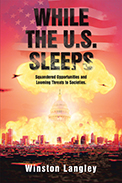
 |
While the U.S. Sleeps: Squandered Opportunities and Looming Threats to Societies
by Winston Langley
Xlibris
Langley's text takes the pulse of America. Through a series of examples that span more than a century, Langley suggests that perhaps a misdiagnosis has occurred. Why American life is teetering is neither due to the figure in power, such as Trump, nor party affiliations but rather a systemic series of patterns that have gradually come to a head in the early parts of the twenty-first century. As the author dissects pivotal events (or missed events that could have been pivotal), his stance is crystal clear: it is imperative to learn from history so that it does not repeat itself.
Referencing a missed opportunity at the second Hague Conference in 1907 to limit armaments, Langley points to its continued impact into the modern day with half-baked efforts to curb the development of lethal weapons and a climate where an arms race among nations has never been more apparent. From losing out on the opportunity to unify the globe with one currency to completely dropping the ball on climate change, the author believes that the United States has become a victim of its own grandeur. In the old days, the Monroe Doctrine and Manifest Destiny spoke to its calling for world supremacy. More recently, it has been the Trump-led America-first policy that led the nation to excuse itself from the Paris Accord, expediting the rate of damage done to the environment.
Throughout, the author raises crucial points on the infrastructure that makes America what it is while also exploring the pertinent question of how much longer its status as a global superpower can last if it continues to get in its own way. Langley's text is easy to read, delivering less of a history book feel and more of a comprehensive cause-and-effect guide map to understanding catalysts like race relations that have led to America's looming threats.